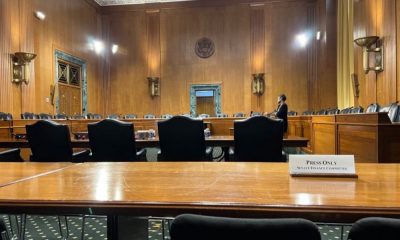National
Anti-LGBTQ laws, drag bans loom over Pride celebrations
Organizers in Florida, Texas, Montana, Tennessee coping with new restrictions

Anti-LGBTQ and anti-drag laws that Republican governors have signed have prompted Pride organizers to reconsider or even cancel their events this year.
The Bozanich Photography Collaborative, which organizes St. Cloud Pride in Florida, in its statement that announced the cancellation of its June 10 event noted the state “has recently passed a number of laws that target the LGBTQIA+ community” and they have “created a climate of fear and hostility for LGBTQIA+ people.”
Florida Gov. Ron DeSantis on May 17 — the International Day Against Homophobia, Biphobia and Transphobia — signed bills that ban gender-affirming health care for minors, restrict pronoun usage in schools and require public buildings and other facilities’ restrooms and locker rooms to have “separate facilities for men and women based on biological sex.” DeSantis on that day also signed House Bill 1438, which “protects children from explicitly adult performances in all venues — including drag shows and strip clubs” and “imposes fines and license suspension for hotels and restaurants that admit a child into an adult performance.”
The Republican presidential candidate last year filed a complaint against a Miami restaurant after LibsofTikTok broadcast a video of children attending a drag show.
The DeSantis administration this year has sought to revoke the liquor license of the Hyatt Regency Miami and filed a complaint against the Orlando Philharmonic Plaza Foundation after children attended drag shows at the respective locations.
Tampa Pride on May 18 announced the cancellation of its “Pride on the River” event. Organizers of Pridefest in Port St. Lucie only allowed those who were at least 21 years old to attend their annual event that took place in April.
Hamburger Mary’s in Orlando has sued DeSantis over HB 1438.
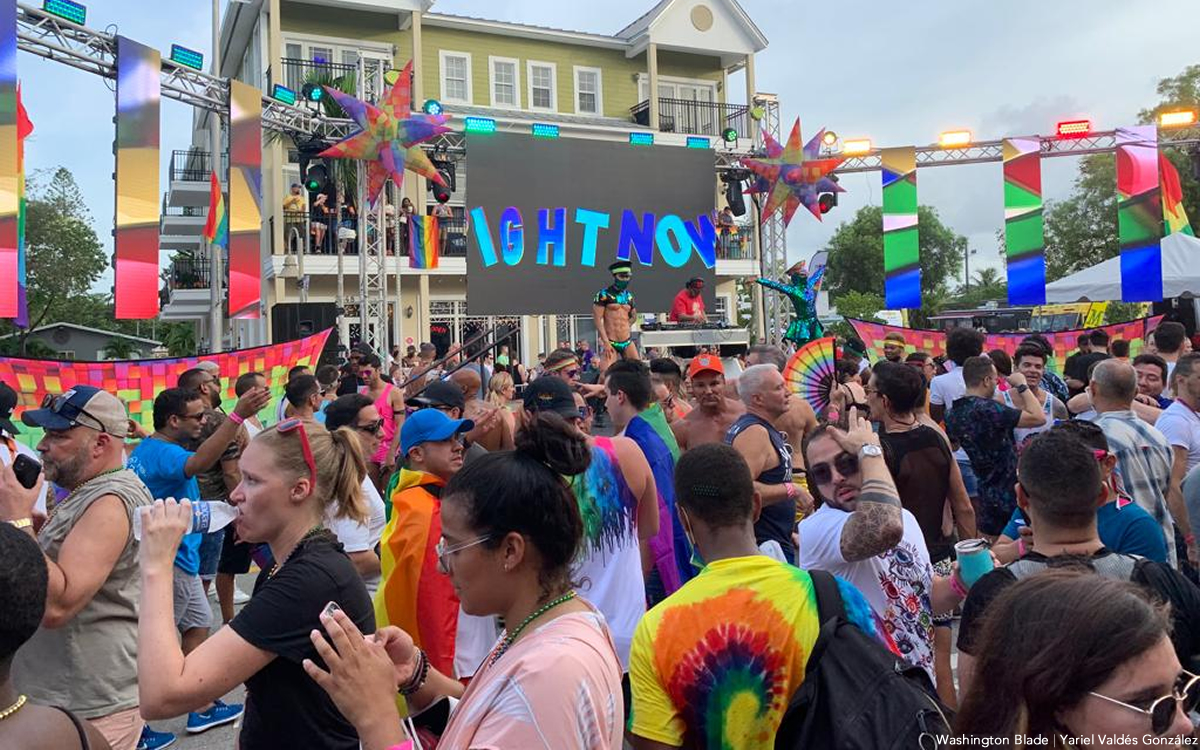
The annual Stonewall Pride Parade and Street Festival is scheduled to take place in Wilton Manors on June 17.
Stonewall Pride CEO Jeffrey Sterling on Monday during a telephone interview with the Washington Blade pointed out Wilton Drive, the road on which the parade and festival will take place, is a state road.
He said performers and vendors will have to abide by a series of rules that include no nudity, no lewd conduct and no vulgarity or overtly sexual language. Sterling admitted HB 1438 and the other anti-LGBTQ bills that DeSantis signed “indirectly” prompted Stonewall Pride to implement them, but he stressed they do not apply to those who attend the parade and festival.
Sterling denied reports that suggest drag queens will not be allowed to perform.
“We need to be proud of the beauty of our culture while keeping in mind who we are entertaining,” he said. “Our standards should be that which we would use around our own children or our families’ nieces or nephews. We are performing for all ages, so the youngest in the audience should dictate the minimum standards we should adhere to.”
Miami Beach Pride took place on April 16, less than a week after Equality Florida and the Florida Immigrant Coalition issued a travel advisory for the state. The event took place before DeSantis signed HB 1438 and the three other anti-LGBTQ laws.
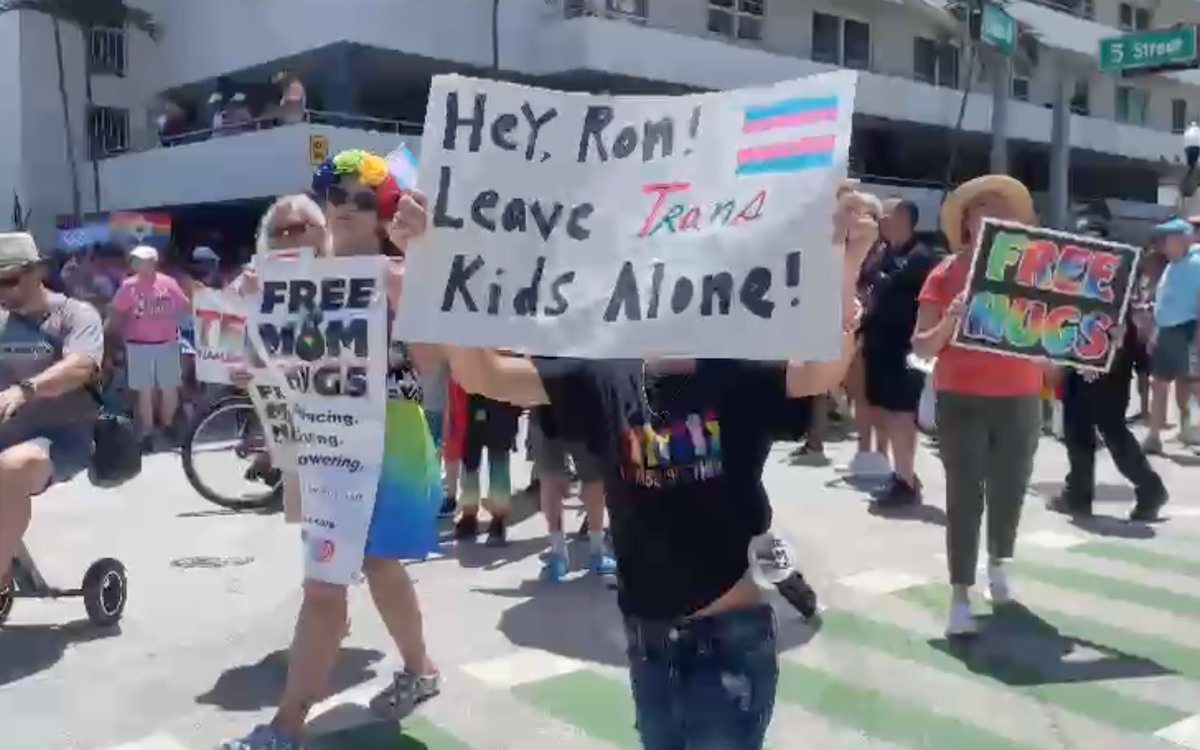
The third annual PensaPride will take place in Pensacola in Florida’s Panhandle on June 24.
Sydney Robinson, who is a member of PensaPride’s board of directors, during a June 1 telephone interview with the Blade noted the all-day festival is a sober event and “family-friendly, open to all ages.”
She noted drag queens typically perform at PensaPride, but organizers are “still sort of grappling to try and do something or if we want to avoid it altogether because of the new law.” Robinson was nevertheless adamant that Pride events should continue to take place in Florida, despite DeSantis and the anti-drag bill he signed.
“I’m really disappointed with any Pride events that cancel for that reason because I think there is a way to have a vibrant Pride event that doesn’t have drag,” she said. “If you really want to follow the law, if that’s your main concern, you could easily do a wonderful Pride event and just not have that element involved.”
“On the other end it’s like well Pride is a protest,” added Robinson. “That was the basis of Pride from the start.”
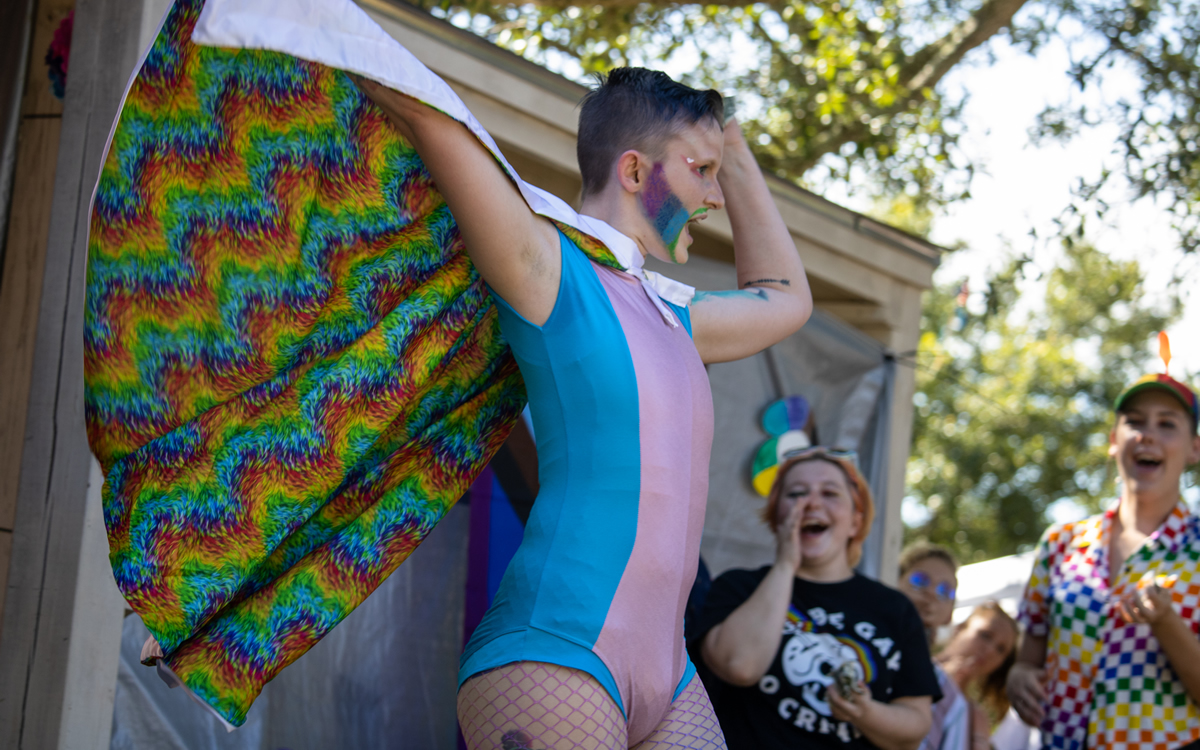
‘We’re more motivated than ever’
Montana Gov. Greg Gianforte on May 22 signed a bill that bans drag story hours in public schools and libraries and restricts “sexually oriented performances” on public property. (His nonbinary child urged him to veto anti-LGBTQ bills that reached his desk during this year’s legislative session.)
Missoula Pride will take place from June 16-18.
“We’re more motivated than ever to put on just one big hell of a Pride festival,” Andy Nelson, executive director of the Western Montana LGBTQ+ Community Center, which organizes Missoula Pride, told the Blade on June 2 during a telephone interview. “This legislative session here in Montana has been devastating and we just need to come together as a community more than ever.”
Nelson noted the bill that Gianforte signed is specific to public libraries and schools. Nelson said drag queens will perform at Missoula Pride as they normally do.
“As far as drag performers performing at our street party in downtown Missoula, we’re good to go,” Nelson told the Blade. “And so we’re going to have a bunch of queens up there, like usual, doing their thing. They’ll be in the parade and we’re still going to have multiple drag events throughout the weekend.”

A document the Department of Homeland Security shared with law enforcement and government agencies on May 11 notes anti-LGBTQ threats are increasing and are linked to “drag-themed events, gender-affirming care and LGBTQIA+ curricula in schools.” The document also warns of the potential increase in attacks against health care providers and businesses that specifically cater to LGBTQ people.
Police in Coeur d’Alene, Idaho last June arrested 31 armed white nationalists who were protesting a Pride event
“We were definitely on edge,” said Nelson, who noted Coeur d’Alene is less than three hours from Missoula and the arrests took place days after Missoula Pride. “What happened there is not out of the question, that it could happen here as well.”
Nelson noted a small group of neo-Nazis with AR-15s in March protested an International Trans Day of Visibility event that took place at Missoula’s courthouse. He said a private security team and members of the Missoula Police Department will be on hand during Pride.
“We’re definitely keeping safety and security top of mind,” said Nelson.
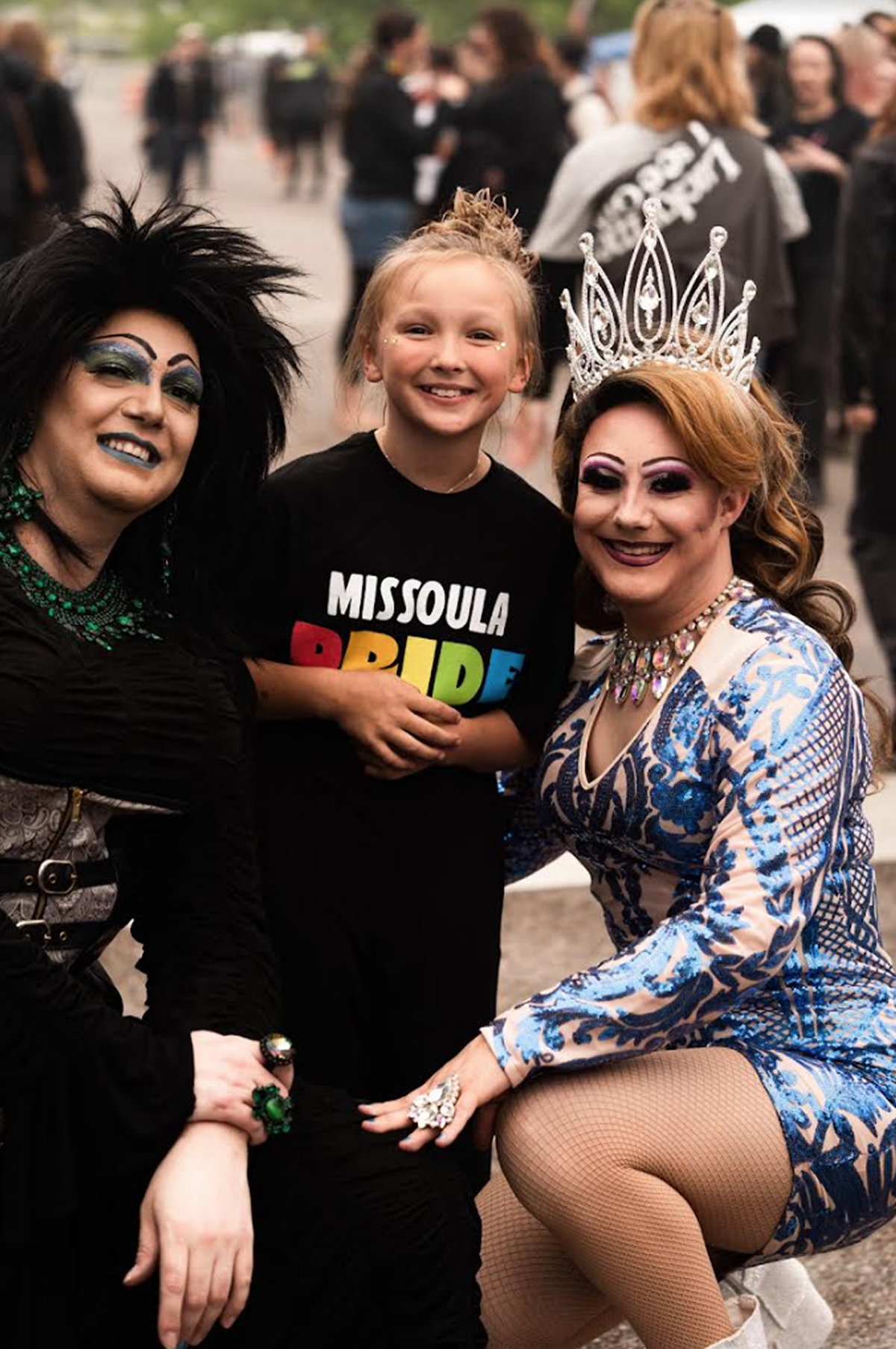
Tennessee Gov. Bill Lee on March 2 signed Senate Bill 2, which imposes fines and even jail time for “male or female impersonators who provide entertainment that appeals to a prurient interest” on public property or where children are present.
Friends of George’s, a Memphis-based LGBTQ theater company, challenged SB 2 in federal court.
U.S. District Court Judge Thomas L. Parker of the U.S. District Court for the Western District of Tennessee on June 2 declared SB 2, which is also known as the Adult Entertainment Act, unconstitutional. The same federal judge temporarily blocked the law hours before it was to have taken effect.
Tennessee Equality Project Executive Director Chris Sanders on Monday noted to the Blade that Pride events took place in Memphis, Cookeville and in other cities across the state over the past weekend.
Sanders said drag queens performed in a public park during Columbia Pride that took place on Sunday. He noted some Pride celebrations “probably did make some contingency plans or change the way their celebration went on, but many continued to have drag as part of their celebrations.”
Sanders told the Blade that activists in Tennessee remain “extremely stressed, particularly about the anti-trans laws.”
The American Civil Liberties Union has filed a lawsuit against the state law that bans gender-affirming care for anyone who is under 18 years old. Sanders noted that statute “continues to hang over everything,” but Parker’s ruling was something to celebrate.
“People got a bit of relief, obviously, because of the drag ruling and people are very excited about that,” said Sanders.
Texas anti-drag bill has ‘broad and vague wording’
Texas Gov. Greg Abbott on June 2 signed a law that bans gender-affirming health care for minors in his state. Senate Bill 12 — which would “regulate sexually oriented performances” and “those performances on the premises of a commercial enterprise, on public property, or in the presence of an individual younger than 18 years of age” — is currently awaiting the Republican governor’s signature.
Nick Harpster, the public relations and advocacy coordinator of Lubbock Pride, on June 1 noted to the Blade during a telephone interview that SB 12 would take effect after his city’s Pride events if Abbott were to sign it into law.
He said SB 12 has “such a broad and vague wording and it’s left up to so much interpretation,” and questioned how it may specficially impact the Dallas Cowboy cheerleaders. Harpster said Texas lawmakers have definitely targeted drag queens with SB 12 and another bill that sought to defund public libraries that host drag queen story hours.
“That’s been the goal from the get go,” said Harpster.
Harpster said Lubbock Pride “may have to do some things differently” next year if Abbott signs SB 12. In the meantime, drag performances and drag story times are among the events that will take place during this year’s Lubbock Pride that will take place on June 10.

Dawn Ennis, Christopher Kane, Michael Key and Brody Levesque contributed to this story.
Federal Government
Lambda Legal praises Biden-Harris administration’s finalized Title IX regulations
New rules to take effect Aug. 1

The Biden-Harris administration’s revised Title IX policy “protects LGBTQ+ students from discrimination and other abuse,” Lambda Legal said in a statement praising the U.S. Department of Education’s issuance of the final rule on Friday.
Slated to take effect on Aug. 1, the new regulations constitute an expansion of the 1972 Title IX civil rights law, which prohibits sex-based discrimination in education programs that receive federal funding.
Pursuant to the U.S. Supreme Court’s ruling in the landmark 2020 Bostock v. Clayton County case, the department’s revised policy clarifies that discrimination on the basis of sexual orientation and gender identity constitutes sex-based discrimination as defined under the law.
“These regulations make it crystal clear that everyone can access schools that are safe, welcoming and that respect their rights,” Education Secretary Miguel Cardona said during a call with reporters on Thursday.
While the new rule does not provide guidance on whether schools must allow transgender students to play on sports teams corresponding with their gender identity to comply with Title IX, the question is addressed in a separate rule proposed by the agency in April.
The administration’s new policy also reverses some Trump-era Title IX rules governing how schools must respond to reports of sexual harassment and sexual assault, which were widely seen as imbalanced in favor of the accused.
Jennifer Klein, the director of the White House Gender Policy Council, said during Thursday’s call that the department sought to strike a balance with respect to these issues, “reaffirming our longstanding commitment to fundamental fairness.”
“We applaud the Biden administration’s action to rescind the legally unsound, cruel, and dangerous sexual harassment and assault rule of the previous administration,” Lambda Legal Nonbinary and Transgender Rights Project Director Sasha Buchert said in the group’s statement on Friday.
“Today’s rule instead appropriately underscores that Title IX’s civil rights protections clearly cover LGBTQ+ students, as well as survivors and pregnant and parenting students across race and gender identity,” she said. “Schools must be places where students can learn and thrive free of harassment, discrimination, and other abuse.”
Michigan
Mich. Democrats spar over LGBTQ-inclusive hate crimes law
Lawmakers disagree on just what kind of statute to pass

Michigan could soon become the latest state to pass an LGBTQ-inclusive hate crime law, but the state’s Democratic lawmakers disagree on just what kind of law they should pass.
Currently, Michigan’s Ethnic Intimidation Act only offers limited protections to victims of crime motivated by their “race, color, religion, gender, or national origin.” Bills proposed by Democratic lawmakers expand the list to include “actual or perceived race, color, religion, gender, sexual orientation, gender identity or expression, ethnicity, physical or mental disability, age, national origin, or association or affiliation with any such individuals.”
Democratic Gov. Gretchen Whitmer and Attorney General Dana Nessel have both advocated for a hate crime law, but house and senate Democrats have each passed different hate crimes packages, and Nessel has blasted both as being too weak.
Under the house proposal that passed last year (House Bill 4474), a first offense would be punishable with a $2,000 fine, up to two years in prison, or both. Penalties double for a second offense, and if a gun or other dangerous weapons is involved, the maximum penalty is six years in prison and a fine of $7,500.
But that proposal stalled when it reached the senate, after far-right news outlets and Fox News reported misinformation that the bill only protected LGBTQ people and would make misgendering a trans person a crime. State Rep. Noah Arbit, the bill’s sponsor, was also made the subject of a recall effort, which ultimately failed.
Arbit submitted a new version of the bill (House Bill 5288) that added sections clarifying that misgendering a person, “intentionally or unintentionally” is not a hate crime, although the latest version (House Bill 5400) of the bill omits this language.
That bill has since stalled in a house committee, in part because the Democrats lost their house majority last November, when two Democratic representatives resigned after being elected mayors. The Democrats regained their house majority last night by winning two special elections.
Meanwhile, the senate passed a different package of hate crime bills sponsored by state Sen. Sylvia Santana (Senate Bill 600) in March that includes much lighter sentences, as well as a clause ensuring that misgendering a person is not a hate crime.
Under the senate bill, if the first offense is only a threat, it would be a misdemeanor punishable by one year in prison and up to $1,000 fine. A subsequent offense or first violent hate crime, including stalking, would be a felony that attracts double the punishment.
Multiple calls and emails from the Washington Blade to both Arbit and Santana requesting comment on the bills for this story went unanswered.
The attorney general’s office sent a statement to the Blade supporting stronger hate crime legislation.
“As a career prosecutor, [Nessel] has seen firsthand how the state’s weak Ethnic Intimidation Act (not updated since the late 1980’s) does not allow for meaningful law enforcement and court intervention before threats become violent and deadly, nor does it consider significant bases for bias. It is our hope that the legislature will pass robust, much-needed updates to this statute,” the statement says.
But Nessel, who has herself been the victim of racially motivated threats, has also blasted all of the bills presented by Democrats as not going far enough.
“Two years is nothing … Why not just give them a parking ticket?” Nessel told Bridge Michigan.
Nessel blames a bizarre alliance far-right and far-left forces that have doomed tougher laws.
“You have this confluence of forces on the far right … this insistence that the First Amendment protects this language, or that the Second Amendment protects the ability to possess firearms under almost any and all circumstances,” Nessel said. “But then you also have the far left that argues basically no one should go to jail or prison for any offense ever.”
The legislature did manage to pass an “institutional desecration” law last year that penalizes hate-motivated vandalism to churches, schools, museums, and community centers, and is LGBTQ-inclusive.
According to data from the U.S. Department of Justice, reported hate crime incidents have been skyrocketing, with attacks motivated by sexual orientation surging by 70 percent from 2020 to 2022, the last year for which data is available.
Twenty-two states, D.C., Puerto Rico, and the U.S. Virgin Islands have passed LGBTQ-inclusive hate crime laws. Another 11 states have hate crime laws that include protections for “sexual orientation” but not “gender identity.”
Michigan Democrats have advanced several key LGBTQ rights priorities since they took unified control of the legislature in 2023. A long-stalled comprehensive anti-discrimination law was passed last year, as did a conversion therapy ban. Last month the legislature updated family law to make surrogacy easier for all couples, including same-sex couples.
A bill to ban the “gay panic” defense has passed the state house and was due for a Senate committee hearing on Wednesday.
Indiana
Drag queen announces run for mayor of Ind. city
Branden Blaettne seeking Fort Wayne’s top office

In a Facebook post Tuesday, a local drag personality announced he was running for the office of mayor once held by the late Fort Wayne Mayor Tom Henry, who died last month just a few months into his fifth term.
Henry was recently diagnosed with late-stage stomach cancer and experienced an emergency that landed him in hospice care. He died shortly after.
WPTA, a local television station, reported that Fort Wayne resident Branden Blaettne, whose drag name is Della Licious, confirmed he filed paperwork to be one of the candidates seeking to finish out the fifth term of the late mayor.
Blaettner, who is a community organizer, told WPTA he doesn’t want to “get Fort Wayne back on track,” but rather keep the momentum started by Henry going while giving a platform to the disenfranchised groups in the community. Blaettner said he doesn’t think his local fame as a drag queen will hold him back.
“It’s easy to have a platform when you wear platform heels,” Blaettner told WPTA. “The status quo has left a lot of people out in the cold — both figuratively and literally,” Blaettner added.

The Indiana Capital Chronicle reported that state Rep. Phil GiaQuinta, who has led the Indiana House Democratic caucus since 2018, has added his name to a growing list of Fort Wayne politicos who want to be the city’s next mayor. A caucus of precinct committee persons will choose the new mayor.
According to the Fort Wayne Journal Gazette, the deadline for residents to file candidacy was 10:30 a.m. on Wednesday. A town hall with the candidates is scheduled for 6 p.m. on Thursday at Franklin School Park. The caucus is set for 10:30 a.m. on April 20 at the Lincoln Financial Event Center at Parkview Field.
At least six candidates so far have announced they will run in the caucus. They include Branden Blaettne, GiaQuinta, City Councilwoman Michelle Chambers, City Councilwoman Sharon Tucker, former city- and county-council candidate Palermo Galindo, and 2023 Democratic primary mayoral candidate Jorge Fernandez.
-

 Africa4 days ago
Africa4 days agoCongolese lawmaker introduces anti-homosexuality bill
-

 District of Columbia1 day ago
District of Columbia1 day agoReenactment of first gay rights picket at White House draws interest of tourists
-

 World4 days ago
World4 days agoOut in the World: LGBTQ news from Europe and Asia
-

 Arizona1 day ago
Arizona1 day agoAriz. governor vetoes anti-transgender, Ten Commandments bill



